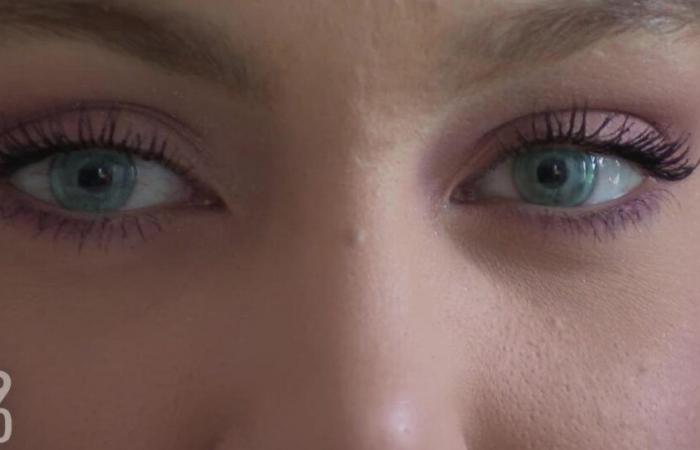Change the color of your eyes, almost in the blink of an eye… Keratopigmentation, or corneal tattooing, is gaining more and more fans. But health professionals are worried and question the regulation of the practice, authorized in Switzerland.
At first glance, Layyons Valença’s eyes look blue. However, his irises are actually brown. Two years ago, the 25-year-old young woman performed keratopgimentation, or tattooing the cornea to hide the natural color of the iris. She went to the only ophthalmologist in French-speaking Switzerland who performs this procedure. In 2024, Théodore Hojabr has tattooed more than 400 corneas between Lausanne and Paris. The operation costs between 8,000 and 10,000 francs.
Boosted by the virality of certain videos on social networks, the number of requests continues to increase. “It’s a bit like the famous word of mouth, but it was done through social networks. (…) People are looking for a perfection that they have imagined,” explains Théodore Hojabr . “This increase is also due to the improvement in technique and the good results obtained,” he adds.
A varied clientele
His clinic has an international and Swiss clientele with very varied profiles: “We welcome patients aged 30, 40, 50. They are housewives as well as businessmen or people who work in the cinema.”
Many of these patients already regularly wore colored lenses before having surgery, like Layyons Valença. “I wore my blue contacts day and night. I felt bad with my brown eyes.” After suffering from numerous infections, the theater student decided to take the plunge.
For her, this intervention was also a way to rebuild herself: “I was a victim of abuse in my childhood. I wanted to change everything that reminded me of my traumas, because I no longer recognized myself. As a victim, my traumas weighed on my self-image. I wanted to find comfort with my physique by looking at myself in the mirror.
>> See also the 36.9° report on the different existing techniques:
Doctors’ concerns
However, keratopigmentation is not without risks. The technique is also banned in certain countries, such as Brazil, which is the kingdom of cosmetic surgery. In Switzerland, the practice is authorized.
-“To the extent that the cornea will be tattooed and opacified, [les médecins peuvent] have difficulty in the long term doing examinations, or even doing surgery”, notes Horace Massa, ophthalmologist at the University Hospitals of Geneva. “Caractar surgery will be significantly more complicated than if you have a transparent cornea”, explains -he.
During the first world congress on keratopigmentation, five cases of corneal deformation were also noted. “At that point, the patient may lose vision,” explains Horace Massa. Some of these cases occurred after an MRI: “There is a magnetic field that is created and if the pigment used for keratopigmentation contains iron residue, it can pull on the cornea and deform it.” Even if he recognizes that “keratopigmentation is not for everyone”, Théodore Hojabr believes that these cases can be avoided if operations on people with suspicious corneas are refused.
A poorly regulated practice
Keratopigmentation, although it has been around for almost twenty years, has recently gained popularity, leading to the organization of a world congress dedicated to changing eye color. Théodore Hojabr is one of the organizers: “As it is a surgery that is not currently well regulated by scientific societies, there are deviations. Everyone does a little bit what they want. The aim of this congress is to set guidelines.”
According to Horace Massa, the technique should really be supervised in Switzerland. Currently, there is a “legal vacuum”, probably due to the fact that this practice is a growing niche. It particularly attracts younger generations and it will still take time before it fully challenges the medical and political world, concludes the HUG ophthalmologist.
Mathilde Salamin/ami






